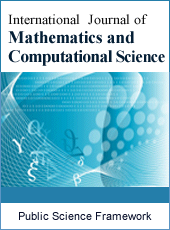International Journal of Mathematics and Computational Science
Articles Information
International Journal of Mathematics and Computational Science, Vol.1, No.3, Jun. 2015, Pub. Date: May 6, 2015
What is Mathematics - an Overview
Pages: 98-101 Views: 5145 Downloads: 5929
[01]
Liaqat Ali Khan, Department of Mathematics, Faculty of Science, King Abdulaziz University, Jeddah, Saudi Arabia.
Mathematics is based on deductive reasoning though man's first experience with mathematics was of an inductive nature. This means that the foundation of mathematics is the study of some logical and philosophical notions. We elaborate in simple terms that the deductive system involves four things: (1) A set of primitive undefined terms; (2) Definitions evolved from the undefined terms; (3) Axioms or postulates; (4) Theorems and their proofs. We also include some historical remarks on the nature of mathematics.
Mathematics Education, Deductive Reasoning, Inductive Reasoning, Primitive Undefined Terms, Axioms, Theorem, Direct Proof, Indirect Proof, Platonism, Formalism
[01]
Joseph Auslander, Review of "What is Mathematics, Really?" by Reuben Hersh, SIAM Review, 42(1) (2000), 138-143.
[02]
Briane E. Blank, Review of "The Pleasures of Counting” by T. W. Körner, Notices Amer. Math. Soc. 45 (1998), 396-400.
[03]
Douglas M. Campbell, John C. Higgins, Mathematics: People, Problems, Results (Volume 2, Taylor & Francis, 1984).
[04]
Alain Connes, A view of Mathematics (38 pages), http://www.alainconnes.org/docs/maths.pdf
[05]
J. J. O'Connor and E F Robertson, The MacTutor History of Mathematics archive (2000), http://www-history.mcs.st-and.ac.uk/
[06]
Richard Courant and Herbert Robbins, What Is Mathematics? : An Elementary Approach to Ideas and Methods (1941); second edition, revised by Ian Stewart (Oxford University Press, 1996).
[07]
Underwood Dudley, What Is Mathematics For? , Notices of AMS, Vol. 57, No. 5 (2010), 608-613.
[08]
Paul Ernest, The Nature of Mathematics; https://www.academia.edu/3188583/ THE_NATURE_OF_MATHEMATICS_AND_TEACHING.
[09]
Leonard Gillman, Review of “What Is Mathematics?”, by Richard Courant and Herbert Robbins, revised by Ian Stewart , Amer. Math. Monthly, 105 (1998), 485-488.
[10]
Arend Heyting, Intuitionistic Views on the Nature of Mathematics, Synthese, 27(1/2), On the Foundations of Mathematics, (May - Jun., 1974), pp. 79-91.
[11]
Reuben Hersh, What is Mathematics, Really? (Oxford University Press, 1997).
[12]
T. W. Körner, The Pleasures of Counting (Cambridge University Press, 1996).
[13]
Kenneth Kunen, The Foundations of Mathematics (Studies in Logic: Mathematical Logic and Foundations) (College Publications, 2009).
[14]
Robert H. Lewis, What is Mathematics? The Most Misunderstood Subject, http://www.fordham.edu/info/20603/what_math
[15]
Ernst Snapper, "The three crises in mathematics: Logicism, intuitionism and formalism", Math. Magzine, 52(4) (1979), 207-216.
[16]
Ernst Snapper, What is Mathematics?, Amer. Math. Monthly, 87(7) (1979), 551-557.
[17]
Ian Stewart, Concepts of Modern Mathematics (Dover Publications, 1975).
[18]
David Tall, The Transition to Formal Thinking in Mathematics, Mathematics Education Research Journal, 20(2) (2008), 5-24.
[19]
Alan Weir, "Formalism in the Philosophy of Mathematics", The Stanford Encyclopedia of Philosophy (Spring 2015 Edition), Edward N. Zalta (ed.), URL =

ISSN Print: 2381-7011
ISSN Online: 2381-702X
Current Issue:
Vol. 5, Issue 2, June Submit a Manuscript Join Editorial Board Join Reviewer Team
ISSN Online: 2381-702X
Current Issue:
Vol. 5, Issue 2, June Submit a Manuscript Join Editorial Board Join Reviewer Team
| About This Journal |
| All Issues |
| Open Access |
| Indexing |
| Payment Information |
| Author Guidelines |
| Review Process |
| Publication Ethics |
| Editorial Board |
| Peer Reviewers |


